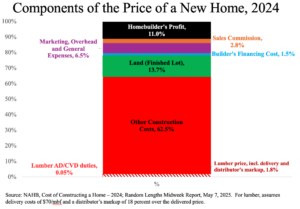U.S. Lumber Coalition Comments on National Association of Home Builders FoxBusiness Statement
CONTACT: Zoltan van Heyningen
[email protected] | 202-805-9133
U.S. Lumber Coalition Comments on National Association of Home Builders FoxBusiness Statement
- The U.S. Government has determined Canada engages in harmful unfair trade practices in softwood lumber.
- Yet NAHB continues to advocate for the importation of injurious unfairly traded Canadian lumber imports.
- Enforcing the U.S. trade laws helps increase the U.S. supply of lumber to build American homes.
Washington, D.C., June 4, 2025 – The National Association of Homebuilders (NAHB) has a long-established policy priority of working with Canada to promote unfettered access to the U.S. market for unfairly traded Canadian lumber. NAHB reports routinely meeting with Canadian officials, presumably to coordinate advancing the objective of removing any trade law enforcement measures against unfairly traded Canadian lumber exports to the United States. In a recent FoxBusiness report highlighting falling lumber prices, down 67 percent since 2021, while housing prices continued to increase, up $89,100 or 21 percent since 2021, https://www.foxbusiness.com/economy/fight-over-lumber-tariffs-could-reshape-future-us-home-building, Jim Tobin, CEO of the NAHB, again indicated a desire to ensure continued access to Canadian lumber imports by stating that “we need to make sure that we have a reliable, affordable source of lumber.”
“It is no secret that Canada engages in harmful unfair trade practices,” stated Andrew Miller, Chair/Owner of Stimson Lumber Company, adding “yet NAHB continues to advocate for the importation of injurious unfairly traded Canadian lumber while paying lip service to the idea of fair and balanced trade. President Trump is exactly right, we do not need unfairly traded Canadian lumber imports. Canadian allies advocating a Canada First trade policy are working against President Trump’s America First pro trade enforcement priorities, and against the President’s goal of further expanding U.S. lumber production and capacity.”
“Through the enforcement of the U.S. trade laws, the U.S. industry has expanded its softwood lumber production capacity since 2016 by some 9 billion board feet, producing an additional 30 billion plus board feet of lumber into the U.S. supply chain,” stated Zoltan van Heyningen, Executive Director of the U.S. Lumber Coalition. “In the process, Canadian lumber companies have directly paid close to $7 billion in duties to the U.S. government, the majority of which will be liquidated into the general fund of the U.S. Treasury.”
“NAHB’s own data shows that the cost of softwood lumber in a new home amounts to less than 2 percent of the total cost of that house, and the cost of any duties levied against Canadian companies is virtually zero to the U.S. consumer,” stated van Heyningen, adding that “NAHB and Canada should stop trying to scare the public about the strong trade law enforcement that has in fact been essential to stabilizing and growing the domestic supply of softwood lumber. It is nothing more than a distraction tactic to avoid having an honest conversation about the origins of U.S. housing affordability problems, such as record profits for homebuilders, and the fact that duties in place today simply represent the level of Canadian unfair trade practices,” added van Heyningen.
“It is ironic that NAHB and Canada are pushing the theme that U.S. consumers pay for the duties, yet they are spending upwards of $50 million dollars a year fighting against the imposition of antidumping and anti-subsidy duties. If consumers truly were the ones paying these duties, then Canadian companies would not care to fight against the imposition of duties. That is just common sense. Frankly, none of the NAHB and Canadian arguments in these matters make any sense.”
“Canada itself has been trying to tackle its own housing affordability problems. Prime Minister Carney made housing affordability a cornerstone of his campaign. When discussing the issue, Prime Minister Carney focuses on true causes of housing affordability problems, which are not totally dissimilar from the United States. What he does not talk about however, is using Canada’s excess softwood lumber production capacity of approximately 8 billion board feet to solve their housing affordability problems,” stated van Heyningen.
“As we have stated many times, if Canadian companies do not like paying duties, then they simply need to stop engaging in unfair trade practices — such as dumping as well as asking for and accepting government subsidies,” concluded Miller.
Enforcing the U.S. trade laws helps increase the U.S. supply of lumber to build American homes, all without impacting the cost of a new home, as demonstrated by data from the National Association of Home Builders (NAHB) and Fastmarkets Random Lengths.

About the U.S. Lumber Coalition
The U.S. Lumber Coalition is an alliance of large and small softwood lumber producers from around the country, joined by their employees and woodland owners, working to address Canada’s unfair lumber trade practices. Our goal is to serve as the voice of the American lumber community and effectively address Canada’s unfair softwood lumber trade practices. The Coalition supports the full enforcement of the U.S. trade laws to allow the U.S. industry to invest and grow to its natural size without being impaired by unfairly traded imports. Continued full enforcement of the U.S. trade laws will strengthen domestic supply lines by maximizing long-term domestic production and lumber availability produced by U.S. workers to build U.S. homes. For more information, please visit the Coalition’s website at www.uslumbercoalition.org.
